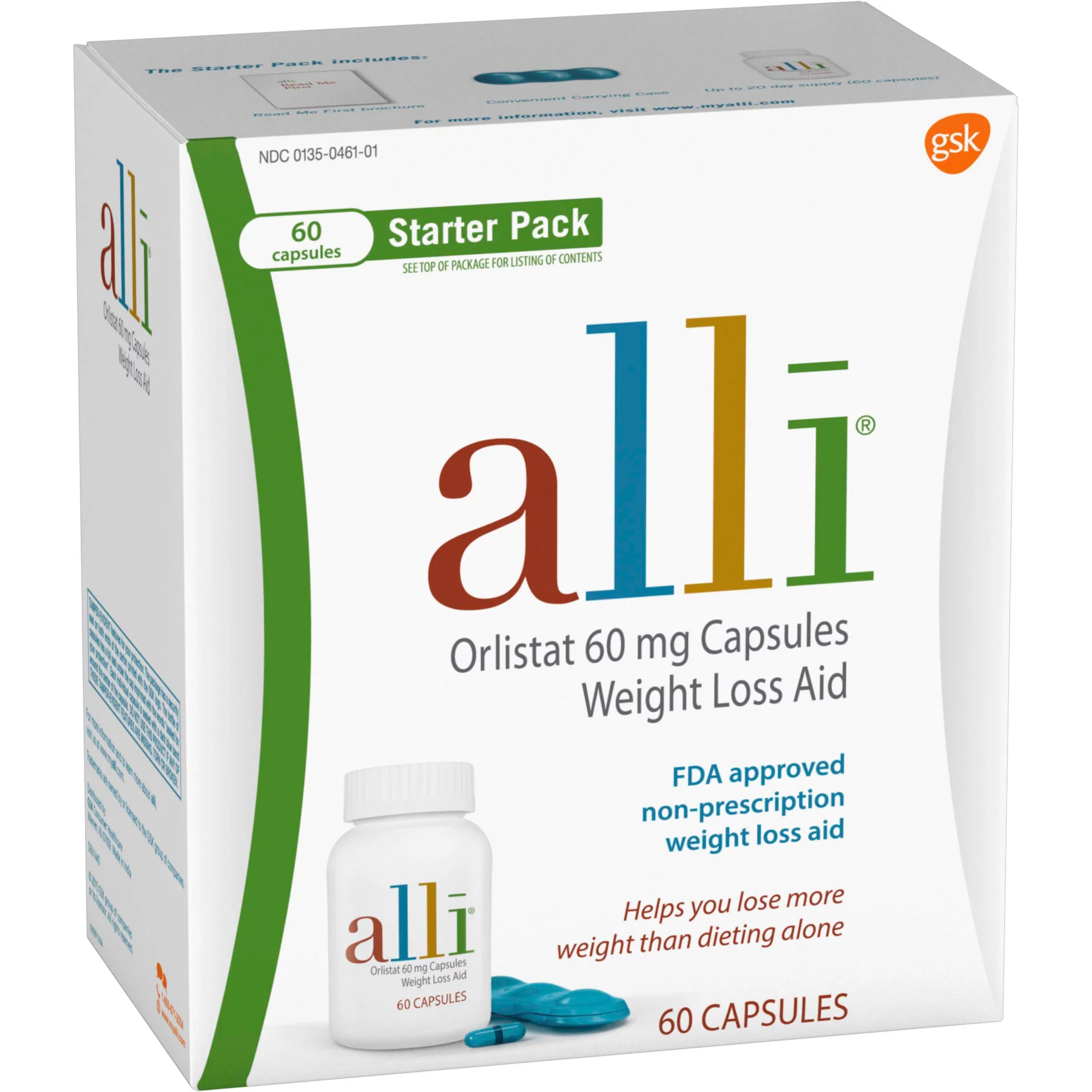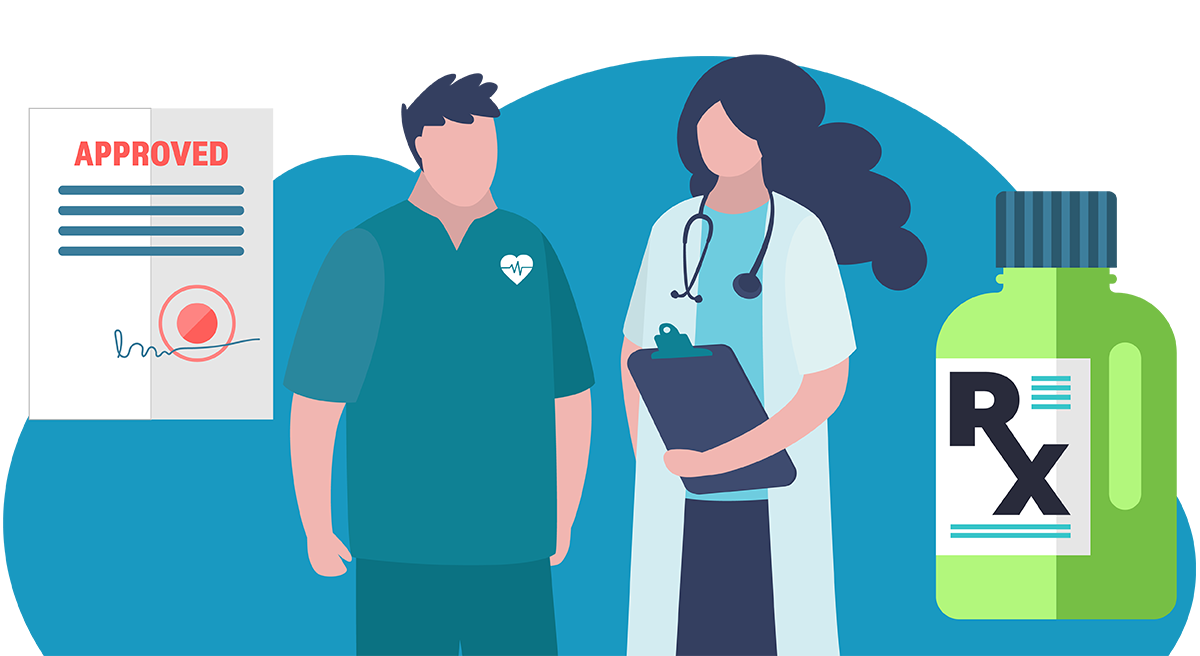Medication Management Prescription Weight Loss Medications
Xenical and Alli (Orlistat)

Xenical (Orlistat) and Alli (Orlistat) are two prescription weight-loss medications that work by reducing the amount of fat absorbed by the body. Both drugs have been approved by the US Food and Drug Administration (FDA) for obesity management in conjunction with a reduced caloric diet, and to reduce the risk of weight gain after prior weight loss.
How do Xenical and Alli work for weight loss?

Xenical and Alli contain the same active ingredient, orlistat, which blocks the action of an enzyme called lipase. Lipase is responsible for breaking down dietary fat in the small intestine into smaller components that can be absorbed by the body.
By blocking lipase, Xenical and Alli inhibit the absorption of certain fats in the intestine. Unabsorbed, these fats pass straight through the digestive system and are excreted in the feces.
Xenical was developed by the Swiss pharmaceutical, Hoffmann-L Roche and was approved by the FDA in 1999. Alli was developed by GlaxoSmithKline and has also been approved by the FDA. Alli is a half-dose version of Xenical.
What are the clinical trial results of Xenical and Alli?
Both Xenical and Alli have been shown to be effective for weight loss when used in partnership with a reduced-calorie diet and increased physical activity.
In clinical trials, participants who took Xenical or Alli lost more weight than those who followed a diet and exercise program alone.
In one study, 80 obese (BMI>30) patients were randomized into one of two groups. Group 1 took orlistat 120 mg three times a day; group 2 received a placebo three times a day. Weight, waist circumference, BMI, total cholesterol, triglycerides, HDL, and LDL were measured at the patients’ baseline and then at the 8th, 16th and 24th weeks.
Compared to placebo, orlistat resulted in significant reduction in weight, BMI, waist circumference, and cholesterol. ¹
What are the health benefits of Xenical and Alli?
The primary health benefits of Xenical and Alli are associated with weight loss and its effects on certain health conditions. Here are some potential benefits:

- Weight loss. Orlistat can help individuals lose weight by reducing the absorption of dietary fats, leading to a decrease in calorie intake. Losing weight can reduce the risk of developing obesity-related medical conditions, including certain types of cancer, heart disease, and sleep apnea.
- Lower cholesterol levels. Orlistat may help reduce levels of total cholesterol and low-density lipoprotein (LDL) cholesterol. Reducing the absorption of dietary fats can indirectly improve lipid profiles.
- Blood pressure management. Weight loss may contribute to better blood pressure control, particularly in individuals with hypertension.
- Diabetes management. Weight loss can improve insulin sensitivity and glycemic control which is particularly important for type-2 diabetics.
Who is a good candidate for Xenical and Alli?
Xenical and Alli differ in dosage and therefore the ideal candidates for these medications may differ depending on a patient’s weight, diet, and lifestyle.
Xenical is available in 120mg capsules and is typically prescribed by a healthcare provider to people who have:
- A body mass index (BMI) of 30 or higher, or
- A BMI of 27 or higher who also have other weight-related health conditions, such as high blood pressure, high cholesterol, or type 2 diabetes.
Xenical is usually taken three times a day with meals that contain about 30% of their calories from fat. The total daily dose of Xenical is 360 mg. If a patient occasionally misses a meal or has a meal without fat, a dose can be skipped with that meal.
Alli is available in 60mg capsules and is sold over-the-counter. It is approved for use in adults who have:
- A BMI of 25 or higher
Like Xenical, Alli is also taken with meals that contain fat. The total daily dose of Alli is 120mg. The capsule should be taken with water. Since Alli works by blocking the absorption of some of the fat you eat, it is important to follow a reduced-calorie, low-fat diet while taking it.
What should I tell my provider when considering Xenical or Alli?
Xenical and Alli can interact with certain medications and supplements, which can affect their efficacy and safety. It is important to inform your healthcare provider of all medications and supplements you are taking before starting treatment with Xenical or Alli.
Also, be sure to tell your healthcare provider about:
- Any medical conditions, past and present
- Any allergic reactions to any medicines
- Any other types of allergies such as to foods, dyes, preservatives, or animals
- Use of alcohol or tobacco
- Breast-feeding
What are the possible side effects of Xenical and Alli?
Both Xenical and Alli can cause gastrointestinal side effects related to their effects on fat absorption. The most common side effects of both drugs are:
- Oily or fatty stools
- Increased bowel movements
- Flatulence
- Stomach upset
These side effects can usually be managed by following a low-fat diet and reducing the dose of the medications. But, in some instances, the side effects can be severe enough to advise discontinuing the drug.
In rare cases, Xenical and Alli have been linked to severe liver injury. However, the risk of liver injury is very low; it is estimated to be less than one case per million users. It is recommended that people taking Xenical or Alli be monitored for signs of liver injury, such as abdominal pain, jaundice, or dark urine.
Other side effects you should report to your healthcare provider as soon as possible include:
- Allergic reactions like skin rash, itching or hives, swelling of the face, lips, or tongue
- Bloody or black, tarry stools
- Any discoloration of your urine or any pain when urinating or any urgent bowel movements
- Nausea, vomiting, flu-like symptoms
- Signs and symptoms of kidney stones like blood in the urine; pain in the lower back or side; pain when urinating
Will I need any supplements when taking Xenical or Alli?
Alli and Xenical can cause decreased absorption of some vitamins. You should talk to your provider about taking a daily multivitamin that contains normal amounts of vitamins D, E, K, and beta-carotene or vitamin A. You should take a multivitamin once per day at bedtime unless instructed otherwise by your provider. Discuss your diet at your regular appointments.
This medicine should be used with a reduced-calorie diet that contains no more than about 30 percent of the calories from fat.
Divide your daily intake of fat, carbohydrates, and protein evenly over your 3 main daily meals. Follow a well-balanced diet.
What should I do if I take too much Xenical or Alli?
If you think you have mistakenly taken too much Xenical or Alli, you should contact your provider or go to the emergency room.
What should I do if I miss a dose of Xenical or Alli?
If you miss a dose, you can take it within 1 hour following the meal that contains fat. However, if it is almost time for your next dose, take only that dose. Never take double or extra doses.

What happens if I stop taking Xenical or Alli?
It is an unfortunate fact that most people who lose weight regain much or all of the weight that they lost. On the one hand, this should be expected if, after losing weight someone stops everything they did to lose weight and goes back to doing everything exactly as they did while gaining weight.
However, making very important lifestyle changes like eating a healthy diet and getting more physically active often are not enough to prevent regaining weight. The reason for this is that when you have obesity, the regulation of your body weight is dysfunctional. Your body will try to push you back to your previous weight. In this situation, Xenical, Alli, or some other long-term weight loss medication may be a necessary part of the care plan needed to keep your weight in a healthier place.
Working with your health care provider after a weight loss program is as important as it is during the weight loss program!
Footnotes:
- National Library of Medicine: https://www.ncbi.nlm.nih.gov/pmc/articles/PMC3125014/
Sources:
Cleveland Clinic: https://my.clevelandclinic.org/health/drugs/19489-orlistat-capsules
Mayo Clinic: https://www.mayoclinic.org/drugs-supplements/orlistat-oral-route/description/drg-20065184
Food and Drug Administration: https://www.accessdata.fda.gov/drugsatfda_docs/label/1999/20766lbl.pdf
Are you ready to start down the path to a healthier you? Prevent, reverse, or manage a chronic disease?
Take control of your health today. Better health IS within your reach.
Take the first step today. Call us today @ (919) 354-7077
Take The Stress Out Of Prior Authorizations
We will work with you, your insurance company, and pharmacy to get your medication needs met.

